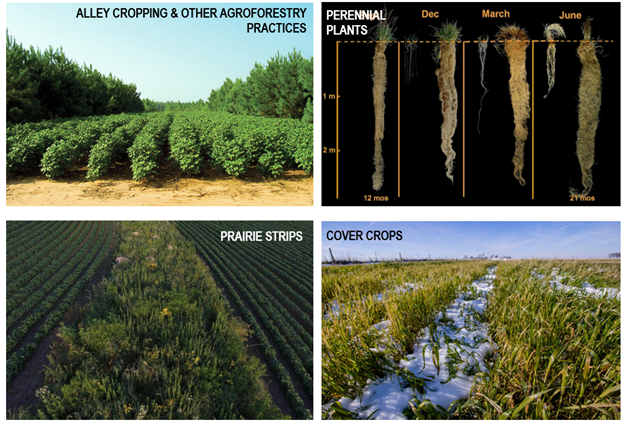What we grow and produce in America affects our air, water, climate, wildlife, public health, and more. The Farm Bill is likely the most significant environmental law Congress will address this year. This second of four blogs explains the many agricultural practices that can reduce greenhouse gas emissions or increase carbon sequestration, and build resilience to extreme and changing weather, but need policy support for wider adoption. (More detail can be found in my book, Farming for Our Future; The Science, Law, and Policy of Climate-Neutral Agriculture.)
Fossil-fuel and chemical-dependent industrialized agriculture systems are not necessary to provide the U.S. with abundant, affordable, nutritious food. Alternative methods including organic, regenerative, and agroecological practices are highly productive and capable of replacing the industrial-scale system American policy currently supports. While it’s true that our system generally does produce more pounds of crops (though not necessarily more nutrition) per acre than more sustainable practices, that production comes at a steep price as discussed in The Real Cost of Food.
This sometimes-lower crop productivity associated with more sustainable practices could likely be improved if more research were directed toward these practices. Despite being a good investment, agricultural research overall has declined dramatically, and research associated with sustainable practices gets only a tiny share of the available funding. With more study, yields and other benefits from sustainable agriculture will increase. This includes improved resilience in the face of extreme weather.
We can also accelerate adoption of more sustainable practices through changes in federal farm policy. Fortunately, we already have ample demonstration of many climate-friendly sustainable farming and ranching practices thanks to producers who have been making changes on their own. Proven practices that agriculture operations can undertake include the following:
- Perennial crops increase carbon storage, produce more food, and are more drought and flood resistant.
- Diverse crop rotations can increase nutrient cycling and nutrient use efficiency, decrease plant diseases and insect pests, assist in managing weeds, reduce soil erosion, and increase soil health.
- Organic fertilizers can reduce greenhouse gas emissions and water pollution and improve soil health.
- Precision application of fertilizer limits nitrous oxide and water pollution.
- Improved manure management practices, such as dry handling and separation, can reduce methane emissions.
- Agroforestry practices incorporate trees into crop rows or pasture areas and increase carbon storage and water and nutrient retention, reduce runoff, and provide shade.
- Cover or winter cropping adds carbon to soils, reduces fertilizer, pesticide, and irrigation needs, and reduces on-farm energy use.
- Managed (or rotational) grazing can improve plant health, soil health, and water infiltration, and in places increase soil carbon.
Utilizing these practices can shift industrial agriculture from being a major driver of climate change to becoming a more climate-neutral industry.
A few climate-friendly agricultural practices:
 Source: Upper right: Dehaan (Jerry Glover) Creative Commons via Wikimedia Commons.
Source: Upper right: Dehaan (Jerry Glover) Creative Commons via Wikimedia Commons.
Sound agricultural law and policy can help accelerate adoption of these practices in many ways.
The environmental oversight tools that have successfully reduced pollution from other industries now largely exempt agriculture from complying with pollution standards that other industries must meet. For example, no regulation requires industrial livestock factories even to report their hazardous air emissions or greenhouse gas emissions, and hazardous pesticide, fertilizer, and manure run-off from farm fields is not regulated under the Clean Water Act and even most animal waste from concentrated animal feeding operations is exempt. Because America is now dominated by industrial agriculture that functions more like factories than small family farms, these exemptions do not make any sense. A small number of industrial-scale facilities produce most of the crops and meats, and also the vast majority of the pollution. Expanding the scope of environmental laws to rightfully cover agriculture pollution from the largest operations (our environmental laws often impose closer oversight over large facilities while not regulating smaller ones) will help policymakers understand the true impact of agriculture and can create incentives and avenues for large industrial operators to reduce their impacts.
Moreover, just as the country cuts energy sector emissions by reducing demand as well as imposing pollution limits, policy can also help reduce excess demand. Indeed, the U.S. now wastes over a third of all food and the federal government, states, and companies are working to reduce waste. And all entities, particularly the U.S. government as the biggest purchaser of food, can help to reduce demand for high-climate-impact foods.
But with the food sector, we have another important opportunity — to re-align incentives farmers and ranchers receive from federal policy. The federal policy should accelerate, not impede adoption of the best agriculture practices listed above. That requires influencing the single largest investment taxpayers make in the environment — the federal Farm Bill — which is up for renewal.